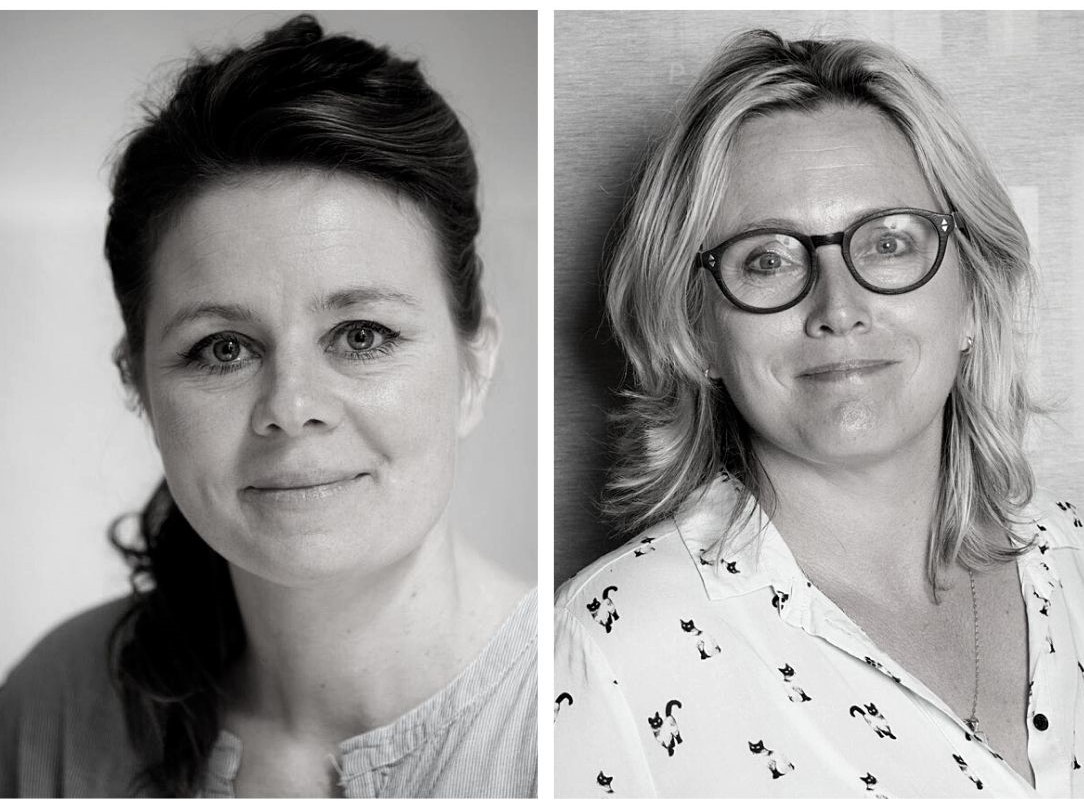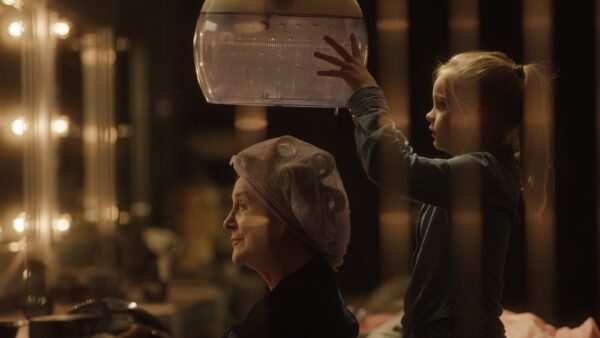Mischa Kamp & Tamara Bos about ‘Romy’s Salon’ “Bakers and butchers are disappearing, but hair salons are still there”

Every day after school, 10-year-old Romy reluctantly stays with her grandma, who works as a hairdresser and has her own salon. Grandma Stine, stiff and strict, has no time for her granddaughter. Until Romy realises that grandma often is messing things up. Gradually they grow closer while Romy is helping her with the new cash register.
‘Romy’s Salon’ is a heart-felt story about a grandchild standing strong when grandma is showing symptoms of dementia. Script author Tamara Bos (‘Minoes’, ‘Winky’s Horse’, ‘Fidgety Bram’) and director Mischa Kamp (‘Winky’s Horse’, ‘Boys’), delicately explain exactly where the story comes from.
Tamara Bos: When my grandmother started showing symptoms of early dementia, it turned out that I handled the situation very differently than my mother. At that time, an older lady was running a hair salon in my neighbourhood. Every day after school, a little girl came to visit her. Combining those two elements, a whole new, very feminine universe took shape in my imagination. I enjoyed telling a story about an older woman still running her own business.
Gert Hermans: That’s how a hair salon became your main location.
Mischa Kamp: To shoot a film in a real hair salon, you have to rent the place for 10 days, which is very expensive. But this was a real barber shop that was for sale.
Tamara Bos: The interior design was from the 70s. Which was great, as in the film it had to look a bit outdated. After all, the salon – and its demolition – partly symbolises grandma’s declining health.

Do you have a soft spot for hair salons?
Kamp: Bakers and butchers are disappearing, but hair salons are still there. You’ll notice it when travelling through the country: no matter which village you go to, there is always a hairdresser.
Bos: And a Chinese restaurant! That is what the film has in common with ‘Winky’s Horse’.
It is a world in its own, with its very own rituals.
Kamp: Making coffee, a bowl of candy on the counter, shelves full of curlers, gossip magazines... all these things are still there today in every barber shop.
Bos: I enjoy integrating such elements in my story. Hairdressing requires professional skills. Luckily, Beppie Melissen (in the role of grandma Stine) herself rarely had to cut hair, because one might look really clumsy when trying.
It’s a place where matters are generally discussed among adults. In the opening scene we see how Romy does not take part in that world.
Bos: She is always surrounded by adults, at the salon, at home, at the truck stop. Such images make it clear that this child, living in a world of grown-ups, has to deal with adult issues.

Grandma isn’t doing very well. Children seem to understand that. How did you make that so clear, without explaining or naming it?
Kamp: You don’t slide into dementia overnight. The truth is in the details: a doctor’s visit, the inability to calculate numbers, Romy discovering at night that grandma is not home... In that scene we understand that grandma begins to realise what is going on. The story is told through the eyes of a child going through a process step by step.
Bos: Meeting with Marie previously, grandma’s client who drops by now and then, children already understand that there are people who seem extremely confused. And there is the strong image of grandma, sitting in her own dressing chair when returning from the hospital. She gives in, the fight is over.
It is strange that this strict grandma is only capable of tenderness once the disease strikes.
Kamp: Together with Beppie, I visited some old people’s homes. We met very angry seniors, but also a lot of elderly people giggling. The transformation from “angry” to “pretty sweet” is not exceptional.
Bos: My grandma became much softer than I had ever known her before. She always used to be very busy and suddenly she sat in a chair and told me a story about an old love, or took my hand. She wanted to buy a very expensive pepper mill for me – I still have it.
Did you do a lot of research?
Bos: I read a lot about the subject and watched documentaries, like one by Louis Theroux – the statement “I am a hairdresser” literally quotes from his film, in which a man says “I AM a dentist”.
What Grandma and Romy have in common is that decisions are often taken for them by others and they have little say in their own destiny.
Bos: The film is about accepting that you do not have everything under control. Some things just happen, and you have to learn to let go. We did not want to make a ‘jolly Alzheimer film’ with grandma acting all funny. In ‘Romy’s Salon’, things are going wrong in a dramatically build up story. With the scenes in the Danish holiday home, where grandma gets extremely confused, we finally let go of the idea of ‘a big audience film’.

But you also added some cosy elements, like Jens the cat. A real “hairdresser’s cat” with beautiful long hair.
Kamp: Together with grandma, the cat goes a long way throughout the story: first locked up, later she enters the salon and is finally taken home by Romy. That cat was very old and perfectly trained. When positioning him somewhere on the set, he would stay put, take after take, with everyone standing around. He was incredible!
Vita Heijmen plays her role in a modest, introverted way.
Kamp: Vita is not a calm girl at all, she is extremely busy. Between two takes she was jumping and skipping all the time. Only when I yelled “action” she would immediately blend into her role. The first day on the set was thrilling. I wasn’t sure if my instructions got through to her, as she was constantly bouncing up and down. But with every take it became clear that she took all my comments with her into that scene.
Beppie Melissen is the most impressing. She realises very well that you recognise dementia mainly by the look in a person’s eyes.
Kamp: Beppie was really going all the way. Sometimes we did seven takes, in increasing degrees of intensity, to see how far we wanted to go. Only for the scenes in which she had to swim in the sea, while the water was not warmer than 10°, we used two stand-ins, trained cold-water swimmers. In those scenes, you see two pairs of Danish buttocks – not Beppie’s.
A scene that sincerely shocked me was the demolition of the hair salon. That is how carelessly we deal with things from the past?
Bos: A whole life thrown away, your stuff is collected, thrown out and voila… you’re gone. It would be nice if we suddenly cut to 20 years later and there is Romy, shining happy in her brand new hair salon. Deep in my heart, I would like it to be that way, but that’s not how life is, unfortunately.
Bos Bros will receive a Platinum Goat Award in this year’s Ale Kino Festival. Can you explain what Burny Bos means to your career?
Bos: Everything! I have always been writing, already as a child, but thanks to my father I saw from an early age how you could make it your profession. I share with him a passion for creating good books, films and TV series for children, stories in which kids are full-fledged characters with their own wishes and desires. I came to writing for film and television through stories for small children. After a while, I was asked to edit stories like ‘Otje’ and ‘Miss Minoes’, and then I got the opportunity to write my first original script: ‘Winky’s Horse’. What I like about Burny is that he is always full of plans and is never afraid to give someone a chance. He was immediately enthusiastic about the idea to have Mischa direct ‘Winky’s Horse’ as her debut film.
Kamp: Burny was a pioneer in making children’s television more serious and interesting, to write children’s books and scripts in which especially small children were showing courage and guts. But what I appreciate most about him is that he is not afraid of all things new, different and unknown. His mind works in the most original way, but he always ensures that the emotions and characters are recognizable and do not deviate from his dramaturgical input. Burnys are scarce, for me there is only one.


